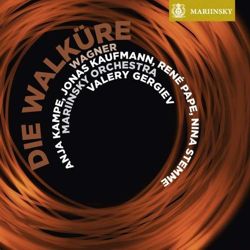|
|
|
|
|
|
|
|
|
Opera News, June 2013 |
| WILLIAM R. BRAUN |
|
|
|
WAGNER: Die Walküre |
|
 Act
I of this performance belongs to Jonas Kaufmann's Siegmund. Buoyant and
lyrical of tone, his portrayal is so engrossing that the long expository
narration after the arrival of Hunding, sometimes the dullest part of the
role in other performances, is a highlight. Otherwise, this most
beloved single act of the Ring is most notable for the unfocused,
stream-of-consciousness conducting of Valery Gergiev. With all good will, it
might be theorized that Gergiev is trying to portray how young and vigorous
Siegmund is supposed to be. But Gergiev's conducting puts the listener in
mind of a cat distracted by a shiny object. This Act I is not so much fast
by the clock (other Walküre Act I performances are shorter in duration) as
relentless in a wearying way. Perhaps it is the high-pressure environment
that makes Anja Kampe's Sieglinde sound so tremulous; she does not sound
this shaky in live performance. But it is lovely that she doesn't scream
when the sword comes out of the tree. Mikhail Petrenko's rudimentary German
makes his Hunding a place-holder. Act
I of this performance belongs to Jonas Kaufmann's Siegmund. Buoyant and
lyrical of tone, his portrayal is so engrossing that the long expository
narration after the arrival of Hunding, sometimes the dullest part of the
role in other performances, is a highlight. Otherwise, this most
beloved single act of the Ring is most notable for the unfocused,
stream-of-consciousness conducting of Valery Gergiev. With all good will, it
might be theorized that Gergiev is trying to portray how young and vigorous
Siegmund is supposed to be. But Gergiev's conducting puts the listener in
mind of a cat distracted by a shiny object. This Act I is not so much fast
by the clock (other Walküre Act I performances are shorter in duration) as
relentless in a wearying way. Perhaps it is the high-pressure environment
that makes Anja Kampe's Sieglinde sound so tremulous; she does not sound
this shaky in live performance. But it is lovely that she doesn't scream
when the sword comes out of the tree. Mikhail Petrenko's rudimentary German
makes his Hunding a place-holder.
The picture changes in Act II, as
it so often does, with the entrance of Wotan. René Pape is nearly ideal in
the role, authoritative with Fricka, intimate with Brünnhilde and always
steady of tone. It's a youthful, suitably god-like sound. The topmost notes
of the role seem more like an extension built onto the voice than an
integral part of it, but that is a small price to pay for this portrayal. In
Act III, Pape offers an unusual perspective on the character. He takes a
very long time to soften even the tiniest bit to Brünnhilde's entreaties.
His implacable rage and disappointment come, it is clear, because her
betrayal is to him a personal one, not merely one to their enterprise. Only
at the very end is there (quite beautifully) a sense that he realizes how
events have veered beyond his own personal sphere. Nina Stemme's soprano has
mezzo colorings, making her a little too worldly-wise for the early section
of the role of Brünnhilde in this opera, but she seems born to play the
Brünnhilde of Götterdämmerung. Ekaterina Gubanova offers a polished Fricka,
This is a curious recording. In the Wotan–Brünnhilde scenes and
in the Siegmund–Brünnhilde scene, we have the two singers we perhaps most
want to hear in these roles today. And we also have a conductor who
is all over the map. Gergiev in fact does the Todesverkündigung quite well.
But other passages sound as if he simply didn't know what is happening in
the opera. The nadir is the tender moment when Brünnhilde is trying to
cajole her father into telling her what is troubling him. The entrance of
Siegmund and Sieglinde in Act II is a grand, sumptuous affair rather than a
panicked flight from danger. Gergiev's jump-cutting makes it seem as if the
characters had no thought processes, raising the question of whether he has
any thought processes himself. Perhaps he thinks that the characters are
cardboard comic-strip characters. But then why have thousands of
commentators never tired of analyzing them?
|
|
|
|
|
|
|
|
|
|
|
|
|
|
|
|
|
|
|